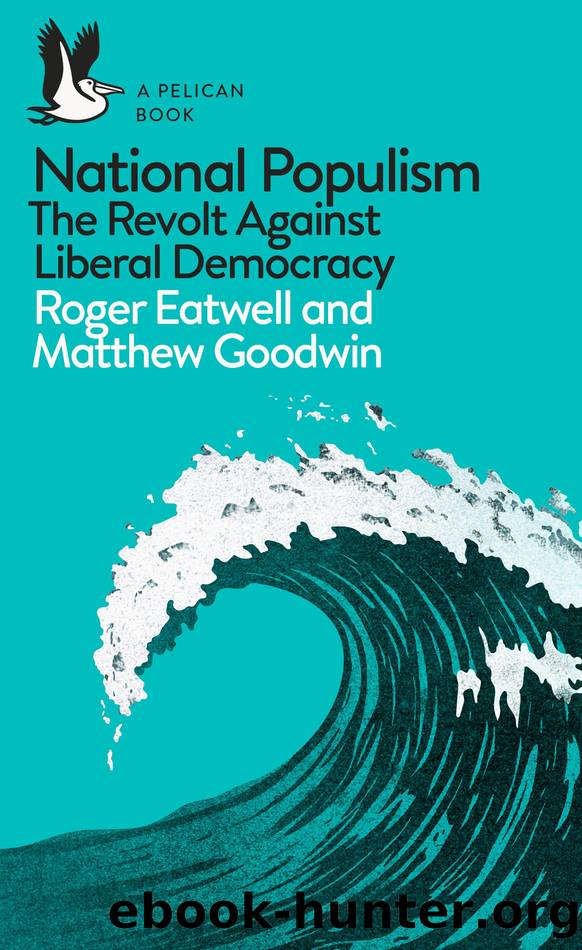National Populism by Roger Eatwell

Author:Roger Eatwell [Eatwell, Roger and Goodwin, Matthew]
Language: eng
Format: epub
ISBN: 9780241312018
Publisher: Penguin Books Ltd
Published: 2018-09-11T00:00:00+00:00
Threatened White Enclaves?
Another myth is that public worries over immigration are divorced from the real world, that national populism only appeals to people who have no experience with immigrants or minorities and who hunker down in threatened white enclaves. This is linked closely to the notion that in the long term the inevitable contact that will occur between different ethnic, racial and religious groups will curb prejudice â an idea that in the social sciences is called âcontact theoryâ. This was inspired by early work during the Second World War which found that the more voyages whites in the US Merchant Marine took with African Americans, the less prejudiced they became.27
But there are good reasons to challenge this line of thinking. First, it does not fit easily with evidence that the people who vote for national populists often live in close proximity to ethnically diverse neighbourhoods, or in communities that are actually undergoing rapid ethnic change. Some scholars like Robert Putnam have argued that in the latter, citizens will, at least in the short term, become less trusting of others, less willing to co-operate, build fewer bridges with other people and withdraw from the wider world (the idea that immigration can produce a decline in mutual regard and trust has also been voiced by thinkers like Paul Collier).28
Others argue that what really matters is the quality of contact between different groups and that most people only experience brief or âfleetingâ contact which can reinforce negative stereotypes and entrench hostility. But we can also explore real-world examples like the US. Despite a long and rich history of immigration and a national story that is built around the âmelting potâ, nevertheless in 2016 more than 62 million Americans decided to elect a president who had promised to clamp down on various forms of immigration.
This had largely been predicted by the scholar Samuel Huntington, who more than a decade before Trump had argued that the profound changes taking place were likely to generate âa move by native white Americans to revive the discarded and discredited racial and ethnic concepts of American identity and to create an America that would exclude, expel, or suppress people of other racial, ethnic, and cultural groupsâ. He pointed to historical experience to argue that this was a highly probable reaction âfrom a once dominant ethnic-racial group that feels threatened by the rise of other groupsâ.29 In fact, long before Trump scholars had already shown that whites living in communities that were experiencing rapid ethnic change were more likely to feel at risk and become supportive of a more restrictive immigration policy. For example, a rapid increase in the relative proportion of Latinos or Hispanics in US counties was positively associated with a hostile reaction to these groups among white Americans.30
There is no doubt that some Americans living in counties that later switched to Trump had witnessed remarkable ethnic shifts. Many areas where Trumpâs message resonated had been historically white, but then during the early years of the twenty-first century had witnessed a rapid influx of non-white and mainly Latino newcomers.
Download
This site does not store any files on its server. We only index and link to content provided by other sites. Please contact the content providers to delete copyright contents if any and email us, we'll remove relevant links or contents immediately.
| Anarchism | Communism & Socialism |
| Conservatism & Liberalism | Democracy |
| Fascism | Libertarianism |
| Nationalism | Radicalism |
| Utopian |
The Secret History by Donna Tartt(19088)
The Social Justice Warrior Handbook by Lisa De Pasquale(12190)
Thirteen Reasons Why by Jay Asher(8910)
This Is How You Lose Her by Junot Diaz(6887)
Weapons of Math Destruction by Cathy O'Neil(6280)
Zero to One by Peter Thiel(5802)
Beartown by Fredrik Backman(5754)
The Myth of the Strong Leader by Archie Brown(5507)
The Fire Next Time by James Baldwin(5446)
How Democracies Die by Steven Levitsky & Daniel Ziblatt(5218)
Promise Me, Dad by Joe Biden(5153)
Stone's Rules by Roger Stone(5088)
A Higher Loyalty: Truth, Lies, and Leadership by James Comey(4964)
100 Deadly Skills by Clint Emerson(4925)
Rise and Kill First by Ronen Bergman(4789)
Secrecy World by Jake Bernstein(4753)
The David Icke Guide to the Global Conspiracy (and how to end it) by David Icke(4719)
The Farm by Tom Rob Smith(4511)
The Doomsday Machine by Daniel Ellsberg(4490)
